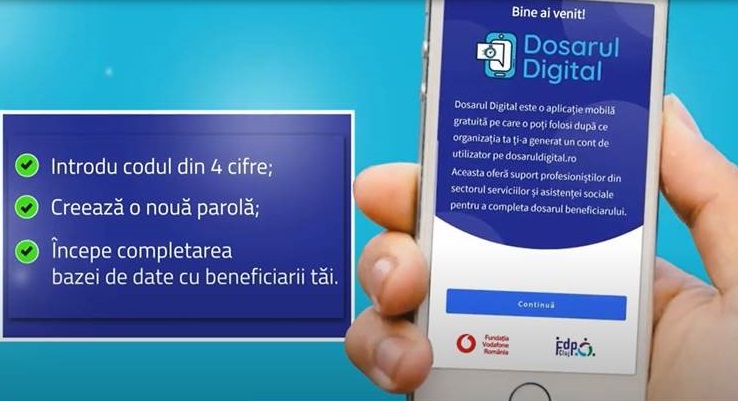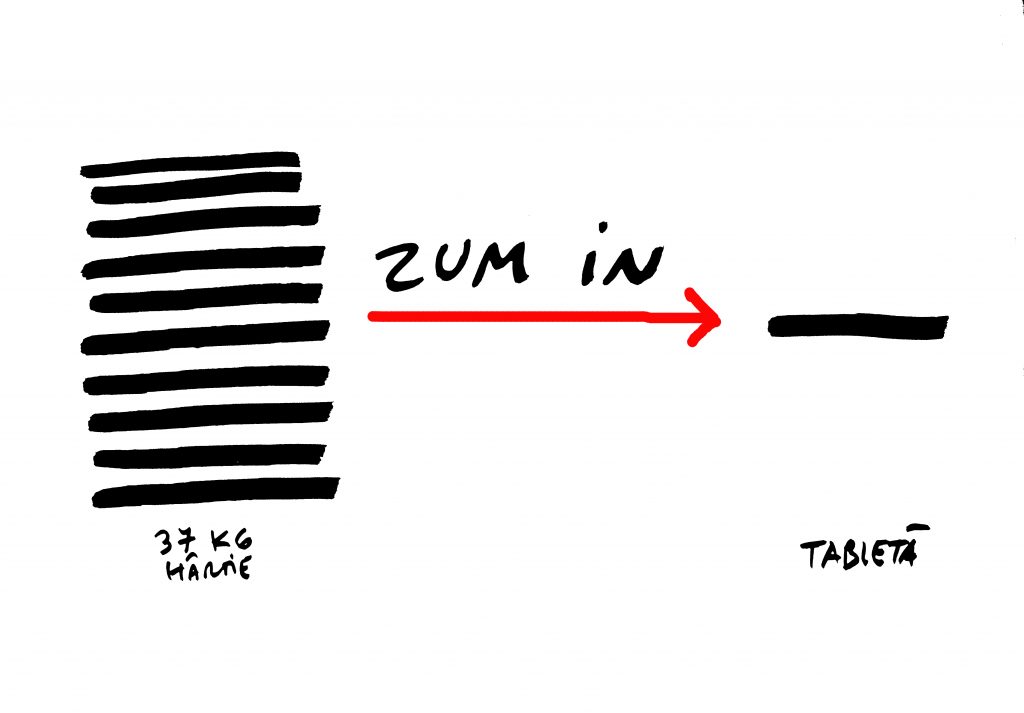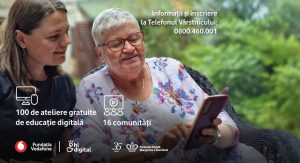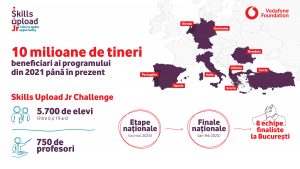Cluj-Napoca/Bucharest, 4 March 2021 – As of today, professionals working in the field of social services, within State institutions or non-governmental organizations, have at their disposal, free of charge, the “Digital File” of the beneficiary. It is the electronic alternative to the classic paper binder, and comes to the aid of social workers, facilitating the creation of documentation, but also their access to the history of beneficiaries, all in safe data processing conditions. The project was funded by the Vodafone Romania Foundation with a budget of 240,000 lei, through the strategic program “Connecting for Good”, and was developed by the People’s Development Foundation Cluj Branch (FDP Cluj), with the support of Code for Romania, within the Civic Labs program.
Along with FDP Cluj, the first beneficiaries of the Digital File are the social workers of the Directorate General for Social Assistance in Bucharest, respectively those of the Directorate for Social and Medical Assistance in Cluj-Napoca, the Faculty of Sociology and Social Assistance of Babeș-Bolyai University Cluj-Napoca and the “Speranța” Empowerment Foundation.
“We are aware of the role of digitalization within our institution and, at the same time, open to this new challenge. Under the constant pressure of time, we are glad that we can test and implement a digital application designed to make the work of social workers easier, a tool that can become indispensable for professionals in this field. The solution allows them to carry out their daily work, from anywhere and anytime, with fast and secure access to the data needed to perform daily tasks. Less manual labor and improved productivity of the social worker are just some of the benefits of this digital application, benefits that will help us achieve efficiency, speed, productivity and a considerable reduction in errors,” said Cosmina Simiean Nicolescu, General Manager of the Directorate General for Social Assistance of Bucharest (DGASMB).
“Under the pressure of the pandemic, we learned to use digital technology for personal and professional purposes. The trend is towards digitalization, and the Directorate for Social and Medical Assistance of Cluj-Napoca has joined this movement. The digitization that we have to assume and that we have to develop more and more in the next period is not a goal in itself. With the Digital File project we provide to specialists in the field, to social workers, first of all, a modern tool in the field work through which material and time resources are saved, with beneficial effect on the quality of social services”, said Aurel Mocan, Executive Manager of the Directorate for Social and Medical Assistance of Cluj-Napoca.
The “Digital File” platform is available by accessing www.dosaruldigital.ro, while the application can be downloaded, for now, on Android devices from Google Play; the iOS version will become available in the next period.
In order to use the solution, the organization or institution that wishes to integrate the “Digital File” in the work practice must request on the platform a user account, after the creation of which it can generate accounts for each of its employees.
Some of the advantages of using the “Digital File” are the collection of data on beneficiaries in electronic format, keeping a history for them accessible at any time, from phone, tablet or PC, simplified reporting to the Directorates General for Social Assistance, but also reducing the time allocated to centralization, transcription and compiling of reports, as the data can be collected and entered in the “Digital File” platform in real time. Last but not least, the solution allows the configuration of forms, according to the needs of each organization or institution.
The Digital File is also a useful tool for organizations working in vulnerable areas, where access to services for community members is limited or non-existent, because it allows for the recurring collection of information, for example, on their health. A common situation is that of pregnant women in these communities who frequently go to the doctor for the first time when giving birth. Monitoring the health of expectant mothers throughout pregnancy would make it much more effective to provide healthcare, where appropriate, with doctors having access to a minimum health record for beneficiaries.
Non-governmental organizations accredited as social service providers and State services have the obligation to complete a lengthy documentation in the form of a physical file, called the “beneficiary’s file”. According to a survey based on a questionnaire applied by FDP Cluj in January-June 2020 among approximately 100 employees from non-governmental organizations and social assistance directorates across the country, 50 of them stated that they allocate 75% of the working time towards completing beneficiaries’ files, and 48 stated that the files contain several documents in which it is necessary to fill out the same information. Another factor that complicates the activity of social workers is the need to constantly go back to the monitoring documentation prepared previously.
People’s Development Foundation Cluj Branch (FDP Cluj) has been working for the community since 1997 and, for more than 6 years, it has been working in Pata Rât, in the most challenged of the communities affected by poverty, where children live on the brink of subsistence and live, literally, surrounded by garbage, in makeshift barracks. Every year, the organization supports more than 200 adults and children in building a new, stable path, oriented towards independence and self-esteem.
The Vodafone Romania Foundation is a Romanian nongovernmental charitable organisation, established in 1998, which operates separately and independently from the company’s business. In over 20 years of activity, Vodafone Romania Foundation has funded 1,168 programs conducted by 745 non-governmental organizations across the country, in the health, education, social services industry. The projects had over 3 million beneficiaries – children, young people, elderly, physically, socially or economically disadvantaged people. So far, Vodafone Romania Foundation invested EUR 31 million in projects conducted by partner non-profit organizations. Further details about the Foundation’s programs are available at www.fundatia-vodafone.ro.
Civic Labs is one of the main programmes of Code for Romania and aims to be the civic technology solution generator for Romania’s social problems. Civic Labs brings a practical contribution to solving real societal needs through an ample research process and through generating solutions with an impact at system level and measurable long-term results.






